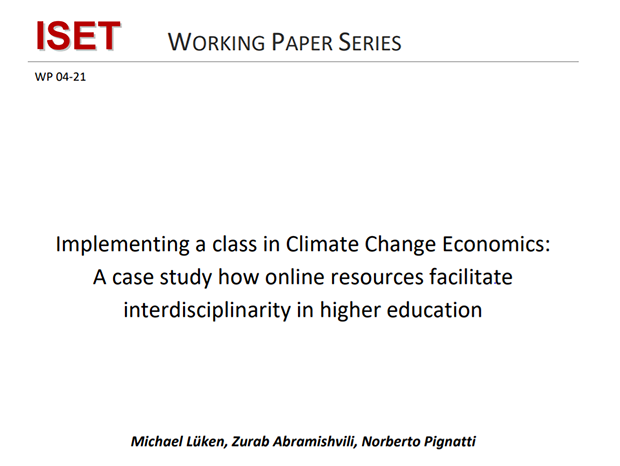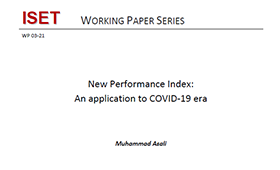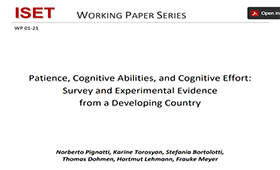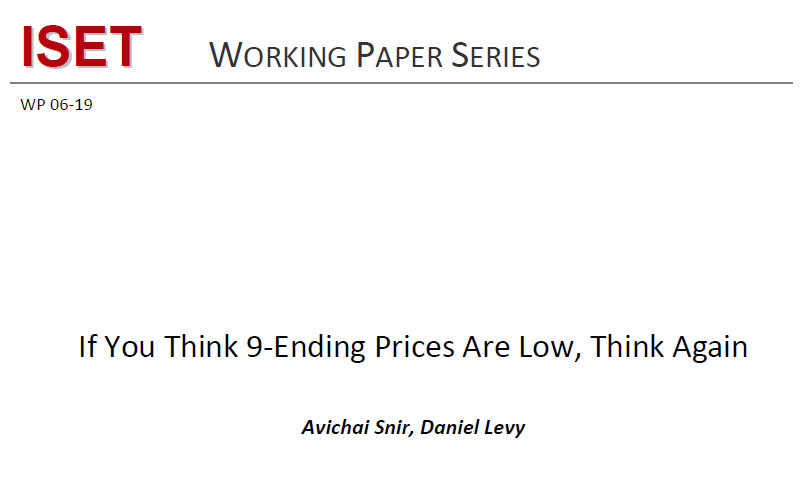Faculty Research
Implementing a class in Climate Change Economics: A case study how online resources facilitate interdisciplinarity in higher education
by Michael Lüken, Zurab Abramishvili, Norberto Pignatti
Tackling human-made Climate Change is among the main global challenges today and in the coming decades. Due to the interdisciplinary structure of the topic, the integration of Climate Change into the relevant higher education programs still lags behind. Online teaching resources such as Massive Open Online Courses (MOOCs) might contribute significantly to overcoming this deficiency...
New Performance Index: An application to COVID-19 era
by Muhammad Asali
In this study I build a performance index that is based on different human capital components, as well as differences in the distribution of these components and of their returns between different genders and ethnic groups. The index can be calculated for individual industries in an economy; it can also be calculated for global economies...
Gender and ethnic wage differentials inhibit growth: A shred of evidence
by Muhammad Asali
Racial, ethnic, and gender wage differentials, in particular those that are not explained by human capital differences between the respective groups, are fixtures of labor markets in almost all countries, developed and developing alike. Discriminatory wage differentials have detrimental social and economic effects. Gender differentials have larger distortional effects than other ethnic and racial differentials, and might call for different policies to address them....
Patience, Cognitive Abilities, and Cognitive Effort: Survey and Experimental Evidence from a Developing Country
by Stefania Bortolotti, Thomas Dohmen, Hartmut Lehmann, Frauke Meyer, Norberto Pignatti, Karine Torosyan
We shed new light on the relationship between cognition and patience, by providing documenting that the correlation between cognitive abilities and delay discounting is weaker for the same group of individuals if choices are incentivized. We conjecture that the exertion of higher cognitive effort, which induces higher involvement of the cognitive system, moderates the relationship between patience and cognition. To test this hypothesis, we analyze the relationship between various measures of cognitive ability, including the cognitive reflection test (CRT)...
Employment vs. homestay and the happiness of women in the South Caucasus
byKarine Torosyan Norberto Pignatti
Modern women often face an uneasy choice: dedicating their time to reproductive household work, or joining the workforce and spending time away from home and household duties. Both choices are associated with benefits, as well as non-trivial costs, and necessarily involve some trade-offs, influencing the general feeling of happiness women experience given their decision. The trade-offs are especially pronounced in traditional developing countries, where both the pressure for women to stay at home and the need to earn additional income are strong, making the choice even more controversial.
The Georgian Tax Lottery of 2012. A Multi-Methodological Assessment
by Lotta Björklund Larsen, Rubina Arakelyan, Teimuraz Gogsadze, Mariam Katsadze, Sophiko Skhirtladze, Nino Muench
Tax lotteries are seen as ways to relatively easily augment public revenue while also increasing compliance. Tax lotteries are constructed so that consumers are nudged to ask for a receipt when making a purchase. This receipt contains information so that it can also be used as a lottery ticket with the possibility of winning prizes. Such tickets also leave traces of transaction records so that revenue authorities can audit vendors. Given this background, the aim of this paper is to provide a broad, multi-methodological and socio-economic assessment of Georgia’s tax lottery experience in 2012.
Pricing Better
by Sourav Ray, Li Wang, Daniel Levy, Mark Bergen
Electronic shelf label (ESL) is an emerging price display technology around the world. While these new technologies require non-trivial investments by the retailer, they also promise significant operational efficiencies in the form of savings in material, labor and managerial costs. The presumed benefits of ESL, for example, tend to be focused around lower price adjustment costs (PAC), also known as menu costs.
vgets: A program to estimate general-to-specific VARs, Granger causality, steady-state effects, and cumulative impulse responses
by Muhammad Asali
Vector Autoregression (VAR) estimation is a vital tool in economic studies. VARs, however, can be dimensionally cumbersome and overparameterized. vgets command allows for a general-to-speci c (GETS) estimation of VARs, overcoming the potential overparameterization, and provides tests for Granger causality, estimates of the long-run e¤ects and the cumulative impulse response of each variable in the system; it also o¤ers diagnostics that facilitate a genuine-causality interpretation of the Granger causality tests.
If You Think 9-Ending Prices Are Low, Think Again
by Avichai Snir, Daniel Levy,
9-ending prices are a dominant feature of many retail settings, which according to the existing literature, is because consumers perceive them as being relatively low. Are 9-ending prices really lower than comparable non 9-ending prices? Surprisingly, the empirical evidence on this question is scarce. We use 8 years of weekly scanner price data with over 98 million price observations to document four findings. First, at the category level, 9-ending prices are usually higher, on average, than non 9-ending prices.
Promise, Trust and Betrayal: Costs of Breaching an Implicit Contract
by Daniel Levy, Andrew T. Young
We study the cost of breaching an implicit contract in a goods market, building on a recent study that documented the presence of such a contract in the Coca-Cola market, in the US, during 1886‒1959. The implicit contract promised a serving of Coca-Cola of a constant quality (the “real thing”), and of a constant quantity (6.5oz in a bottle or from the fountain), at a constant nominal price of 5¢. We offer two types of evidence. First, we document a case that occurred in 1930, where the Coca-Cola Company chose to incur a permanently higher marginal cost of production, instead of a one-time increase in the fixed cost, to prevent a quality adjustment of Coca-Cola, which would be considered a breach of the implicit contract.
More...
A Tale of Two Tracks
Selling Wine in Downtown: Who is the Urban Winery Consumer?
Labor Market Discrimination and the Macroeconomy
Not all price endings are created equal: Price points and asymmetric price rigidity
CONTACT US
16, Zandukeli St,
0108 Tbilisi,
Georgia
Telephone: (+995 32) 250 71 77
Email: info@iset.ge











